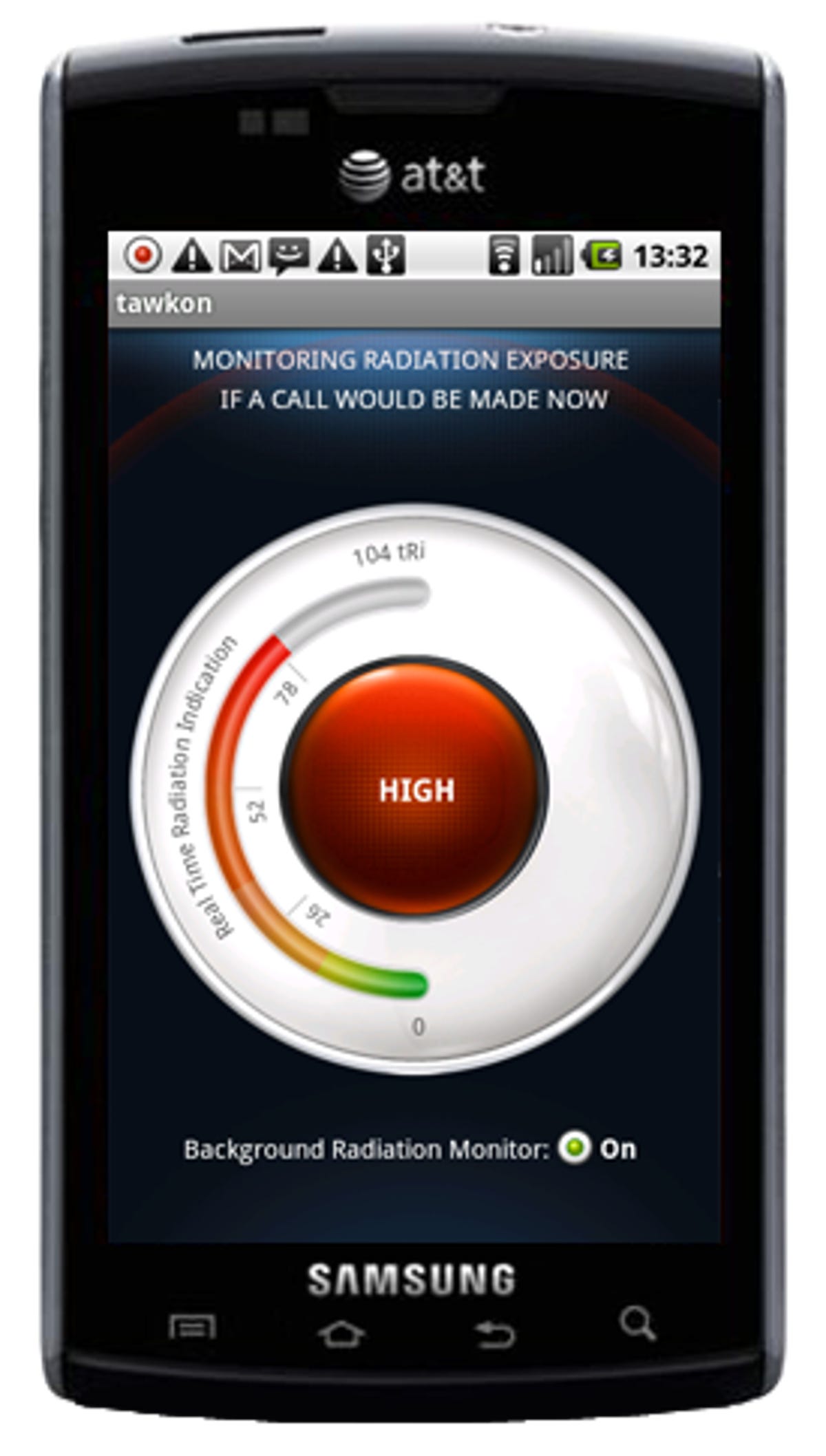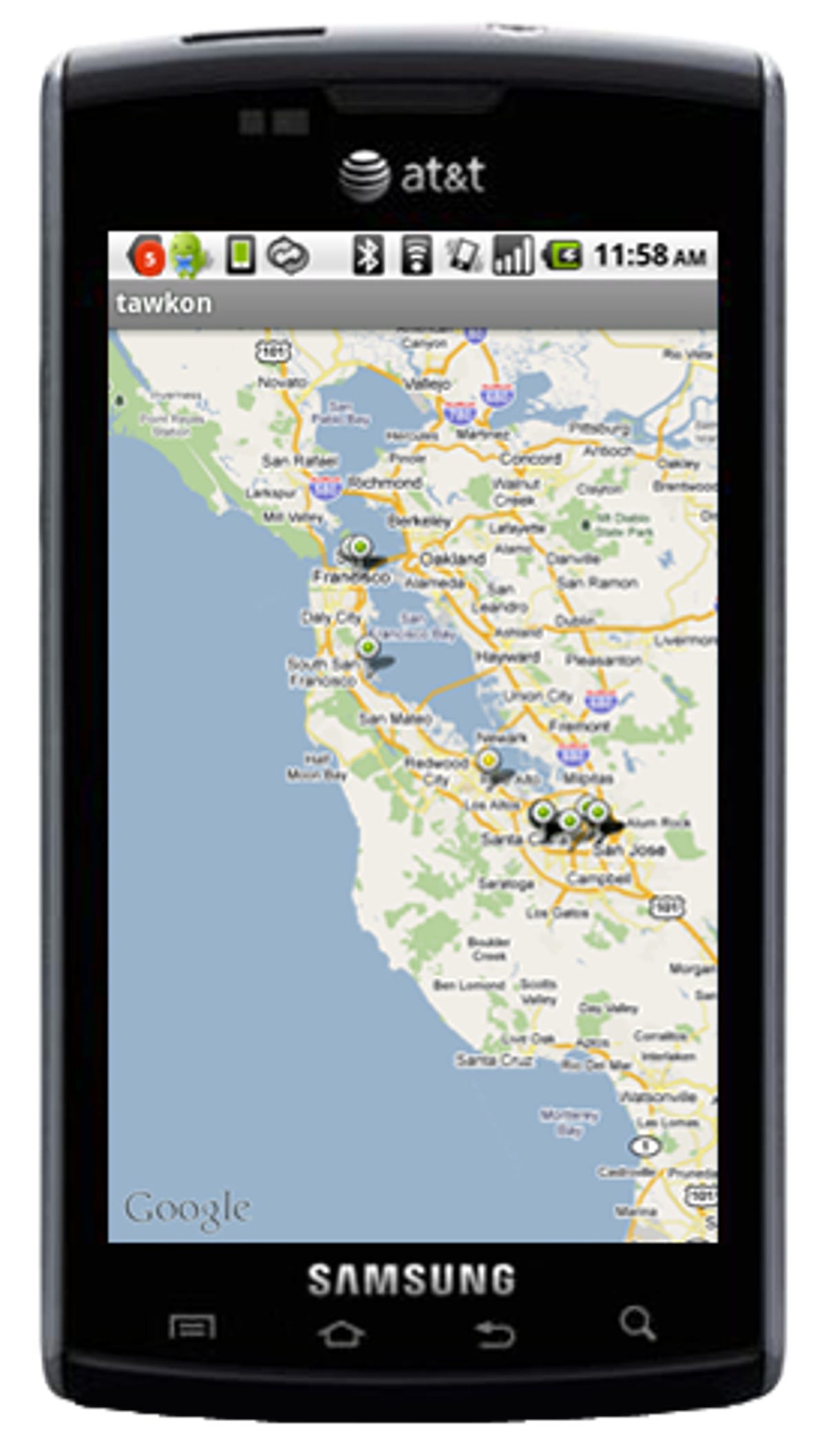Tawkon, a small Israeli start-up, announced Monday that its cell phone radiation detection application has arrived for Google Android phones.
The company’s mobile application uses an algorithm that measures your specific absorption rate or SAR (See also: CNET’s Quick Guide: Cell phone radiation levels). This is the rate at which your whole body absorbs energy from a radio frequency magnetic field. Specifically, the company measures the amount of radiation that is emitted from the phone; it uses the phone’s GPS technology and accelerometers to gauge the position and proximity of the device to the body to determine the amount of radiation that is being absorbed into the person using the phone.

Tawkon
The idea behind the app is to let consumers know how much radiation they are exposed to while talking on a phone. It is not to scare consumers into using their cell phones less.
“We would never tell people to stop using their cell phones,” said Gil Friedlander, co-founder and CEO of Tawkon. “But when you drive a car, you put on your safety belt. When you are trying to get to a healthy weight to prevent illnesses like heart disease, you count calories. We’re just trying to make sure that consumers have as much information as possible to make decisions about how to reduce their exposure to cell phone radiation.”
The app alerts users with a vibration when the SAR has reached a certain threshold. Users can then decide to move the device away from the body, or they may move to a different part of their home or office while talking on the phone.
Moving a cell phone even a few inches from the body can greatly reduce radiation exposure. Many consumers also don’t realize that cell phones emit different amounts of radiation depending on where they are with respect to a carrier’s cell phone tower. The further away a subscriber is from the cell tower, the weaker the signal. In order to connect to the cell tower, the device must boost its power, which increases the amount of radiation emitted.
Scientists know that humans absorb this radiation, but what is still unknown is what effect this has on health. Some studies suggest there is a link between cell phone radiation and some cancers. Other research refutes these findings.
The Interphone study, which began over a decade ago and involved 13 countries, was supposed to settle the dispute. But the report’s publication has been delayed as researchers disagree over how to interpret the data. For now, most researchers agree that more data is needed to know for certain what the effects are.
In the meantime, some countries and at least one city in the U.S. are requiring the industry to either warn or inform consumers about cell phone radiation. For example countries such as France and Israel have released official warnings of cell phone radiation, particularly warning against the use of cell phones by children. Earlier this year, the city of San Francisco became the first city in the U.S. to require handset makers to post in stores their products’ specific absorption rate.
Wireless industry association CTIA is now suing the city of San Francisco over this requirement, arguing that they are unnecessary and will confuse consumers as well as add additional costs to handset manufacturers.
Tawkon’s announcement was made in San Francisco as a way to symbolically support San Francisco’s “Right to Know” campaign and legislation.
In addition to the new beta version for the app on Android phones, Tawkon also announced that it is using anonymous information culled from its users to provide free access to a radiation map, powered by Google Maps, that makes radiation exposure levels publicly available to users worldwide.


Tawkon
The app also provides an in-home or office map that allows users to predict where radiation is the lowest and highest based on their individual usage. The idea is that given this information, consumers can choose to use their mobile phones in areas where radiation is the lowest, or they can reduce exposure in areas with more radiation by using a headset. The app also provides personal statistics based on usage that gives wireless subscribers an indication of how much radiation they’ve likely been exposed to during the last call, day, week, month, or six months.
Tawkon initially released its app for Research In Motion’s BlackBerry operating system. And now it offers the app for the Google Android OS. The company submitted its app to the iPhone App Store, but it was rejected.
Friedlander said Apple told the company that the app was rejected because it used undocumented APIs.
“We’re hoping Apple will add these to the SDK (software development kit), so we can have our app added to the App Store,” he said.
For now, the app is still unavailable on the iPhone.
Because the application must be tested and calibrated for each individual piece of hardware, it is not yet available for every BlackBerry or Android device. Currently, the app is available for the BlackBerry 9700, 9000, 8900, and 8520. And it will initially be available for several Samsung Android devices, with more manufacturers being added soon, Friedlander said.
The app can be purchased from the BlackBerry App World for $9.99. New users can download the app for free and get access to the app for 75 calls. After that, they must purchase the app to continue using it. Android users can download the app for free from the Android Market. They will get free use of the app in exchange for in-app advertising.
He recommends that wireless subscribers interested in downloading the app register on Tawkon’s Web site. The company will notify those registered when new models are added.



